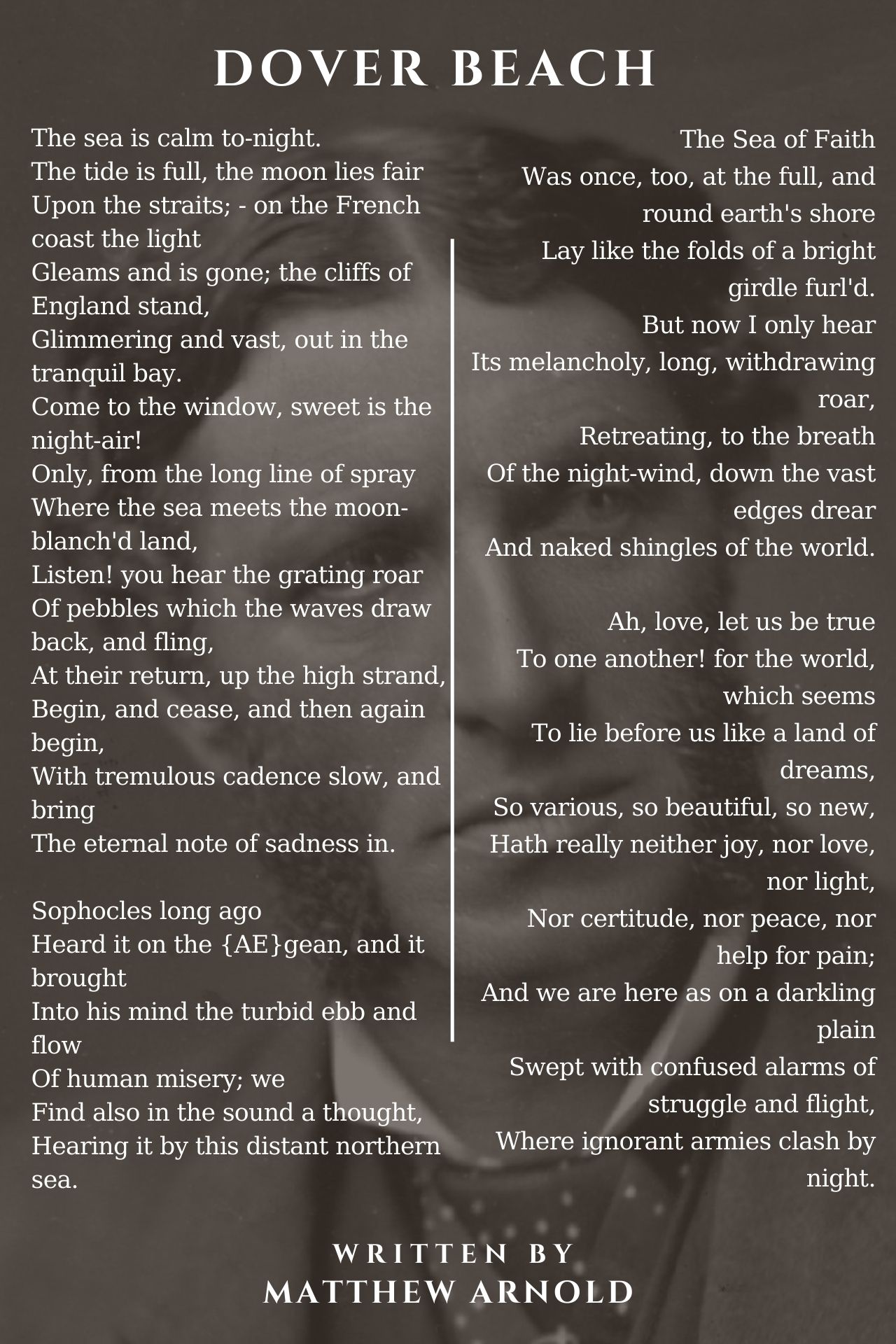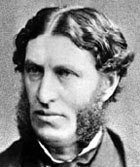Dover Beach Poem by Matthew Arnold
Dover Beach
The sea is calm to-night.
The tide is full, the moon lies fair
Upon the straits; - on the French coast the light
Gleams and is gone; the cliffs of England stand,
Glimmering and vast, out in the tranquil bay.
Come to the window, sweet is the night-air!
Only, from the long line of spray
Where the sea meets the moon-blanch'd land,
Listen! you hear the grating roar
Of pebbles which the waves draw back, and fling,
At their return, up the high strand,
Begin, and cease, and then again begin,
With tremulous cadence slow, and bring
The eternal note of sadness in.
Sophocles long ago
Heard it on the {AE}gean, and it brought
Into his mind the turbid ebb and flow
Of human misery; we
Find also in the sound a thought,
Hearing it by this distant northern sea.
The Sea of Faith
Was once, too, at the full, and round earth's shore
Lay like the folds of a bright girdle furl'd.
But now I only hear
Its melancholy, long, withdrawing roar,
Retreating, to the breath
Of the night-wind, down the vast edges drear
And naked shingles of the world.
Ah, love, let us be true
To one another! for the world, which seems
To lie before us like a land of dreams,
So various, so beautiful, so new,
Hath really neither joy, nor love, nor light,
Nor certitude, nor peace, nor help for pain;
And we are here as on a darkling plain
Swept with confused alarms of struggle and flight,
Where ignorant armies clash by night.

With this particular poem I disagree with pruchnicki because I think this is a beautiful poem- the language Arnold uses here is almost like music to me. But I don't think that people should get their noses bent out of shape just because someone writes a negative comment about a poem. Everyone has a right to their opinion even if it is negative- when someone writes a poem or does any work of art or music they have to be prepared for the fact that it isn't often that 100% of people who read, look at or listen to it- are going to like it. In a way I respect Pruchnicki for being so open and honest and not lying about how he feels and speaking his own voice.
This poem speaks so beautifully to how I have felt after becoming handicapped and after a failed relationship with an unstable, destitute, mentally ill woman, both experiences of which have fundamentally shaped how I view reality. Health and well-being are frighteningly thin veneers. One of the truest fragments of the English language is in this poem: no help for pain.
How do long-winded comments full of compound/complex sentences help the reader to comprehend a rather basic poem in any way whatsoever? Sure, you can bask in the sun of your own verbal skills as you muck about in the offal of your own linguistic excesses - 'Let my skills weave their magic! Soon enough you'll be as entranced as I am with my ability to confuse and tantalize the wayward reader who falls headlong into the trap I've built with nothing but indirection and cunning, ' you'll boast. What in the world does Craddock mean by the following? - 'Arnold writes a poetic invention to solve and address the confict of ideas and attitudes (sic) the scientific challenge of Darwinism, and the religious doubt and confusion it produced in some with a sudden abandonment of God, wrought upon the psyche of diminishing belief.' (What?) Count the words and the parts of speech in this monster of a sentence (simple? compound? complex? compound-complex?) and separate the dependent clauses from the independent clauses as you try to make out the confusion 'wrought' by noun/pronoun confusion! And you'll agree that the sentence (?) is far from well-wrought! ! My God, Craddock, you've infected me with the bad grammar virus! As for the local atheist, ignore him or you'll lose your immortal soul!
The timeless truth so deeply, truthfully and beautifully said. Brilliantly unforgettable@
What a Poem! All of life and so much more. Each time I read it, I love it more.
Ageless masterpiece! One of the best and most universal poems of all times.
I can get the essence of this poem from its concluding line
This poem has not been translated into any other language yet.
I would like to translate this poem
Published in 'New Poems' in 1867, 'Dover Beach' is Arnold's early poem. Immediately after his marriage with Francis Lucy Whitman, he visited Dover Beach with her. Yet he does not feel happy nor does he romanticise the poem. He laments here the loss of faith in religion which is the sole characteristic of Victorian Era. The poem's note is melancholic. It is at once religious, philosophical and emotional. Great poem indeed.